References huether - Study guides, Class notes & Summaries
Looking for the best study guides, study notes and summaries about References huether? On this page you'll find 68 study documents about References huether.
Page 2 out of 68 results
Sort by
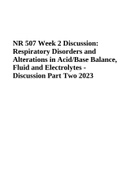
-
NR 507 Week 2 Discussion: Respiratory Disorders and Alterations in Acid/Base Balance, Fluid and Electrolytes - Discussion Part Two 2023
- Exam (elaborations) • 24 pages • 2023
-
Available in package deal
-
- $16.49
- + learn more
NR 507 Week 2 Discussion: Respiratory Disorders and Alterations in Acid/Base Balance, Fluid and Electrolytes - Discussion Part Two 2023. Dr. Brown and Class, Respiratory diseases can have very non-specific symptoms, which can make forming a diagnosis difficult. The general symptoms of a respiratory tract infection include: cough (with or without sputum production), hemoptysis, weight loss, breathlessness, night sweats, fever, general lethargy, and malaise (Kaufman, 2011). It appears Tammy was...
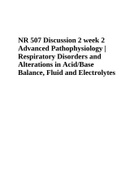
-
NR 507 Discussion 2 week 2 Advanced Pathophysiology | Respiratory Disorders and Alterations in Acid/Base Balance, Fluid and Electrolytes
- Exam (elaborations) • 66 pages • 2023
- Available in package deal
-
- $18.49
- + learn more
NR 507 Discussion 2 week 2 Advanced Pathophysiology | Respiratory Disorders and Alterations in Acid/Base Balance, Fluid and Electrolytes. Discussion Part Two (graded) Tammy is a 33-year-old who presents for evaluation of a cough. She reports that about 3 weeks ago she developed a “really bad cold” with rhinorrhea. The cold seemed to go away but then she developed a profound, deep, mucus-producing cough. Now, there is no rhinorrhea or rhinitis—the primary problem is the cough. She devel...
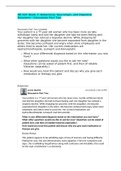
-
NR 507 Week 7: Behavioral, Neurologic, and Digestive Disorders - Discussion Part Two
- Exam (elaborations) • 44 pages • 2023
-
- $12.99
- + learn more
VNR 507 Week 7: Behavioral, Neurologic, and Digestive Disorders - Discussion Part Two Discussion Part Two (graded) Your patient is a 77-year-old woman who has been more socially withdrawn lately and told her daughter she had not been feeling well. Her daughter has noticed a stepwise decline. While shopping for groceries with her daughter she became separated from daughter in the aisles. She became confused and angry when store employees and others tried to assist her. Her current medicatio...
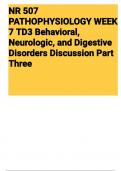
-
NR 507 PATHOPHYSIOLOGY WEEK 7 TD3 Behavioral, Neurologic, and Digestive Disorders Discussion Part Three WITH COMPLETE SOLUTIONS A+ RATED
- Exam (elaborations) • 42 pages • 2023
-
- $8.49
- + learn more
Week 7: Behavioral, Neurologic, and Digestive Disorders - Discussion Part Three Loading... This week's graded topics relate to the following Course Outcomes (COs). 1 Analyze pathophysiologic mechanisms associated with selected disease states. (PO 1) 2 Differentiate the epidemiology, etiology, developmental considerations, pathogenesis, and clinical and laboratory manifestations of specific disease processes. (PO 1) 3 Examine the way in which homeostatic, adaptive, and compensatory phys...
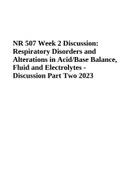
-
NR 507 Week 2 Discussion: Respiratory Disorders and Alterations in Acid/Base Balance, Fluid and Electrolytes - Discussion Part Two 2023
- Exam (elaborations) • 24 pages • 2023
-
- $18.49
- + learn more
NR 507 Week 2 Discussion: Respiratory Disorders and Alterations in Acid/Base Balance, Fluid and Electrolytes - Discussion Part Two 2023. Tammy is a 33-year-old who presents for evaluation of a cough. She reports that about 3 weeks ago she developed a “really bad cold” with rhinorrhea. The cold seemed to go away but then she developed a profound, deep, mucus-producing cough. Now, there is no rhinorrhea or rhinitis—the primary problem is the cough. She develops these coughing fits that are...
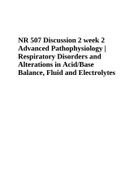
-
NR 507 Discussion 2 week 2 Advanced Pathophysiology | Respiratory Disorders and Alterations in Acid/Base Balance, Fluid and Electrolytes
- Exam (elaborations) • 66 pages • 2023
- Available in package deal
-
- $16.49
- + learn more
NR 507 Discussion 2 week 2 Advanced Pathophysiology | Respiratory Disorders and Alterations in Acid/Base Balance, Fluid and Electrolytes. Discussion Part Two (graded) Tammy is a 33-year-old who presents for evaluation of a cough. She reports that about 3 weeks ago she developed a “really bad cold” with rhinorrhea. The cold seemed to go away but then she developed a profound, deep, mucus-producing cough. Now, there is no rhinorrhea or rhinitis—the primary problem is the cough. She devel...
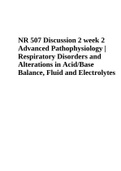
-
NR 507 Discussion 2 week 2 Advanced Pathophysiology | Respiratory Disorders and Alterations in Acid/Base Balance, Fluid and Electrolytes
- Exam (elaborations) • 66 pages • 2023
-
Available in package deal
-
- $16.49
- + learn more
NR 507 Discussion 2 week 2 Advanced Pathophysiology | Respiratory Disorders and Alterations in Acid/Base Balance, Fluid and Electrolytes. Discussion Part Two (graded) Tammy is a 33-year-old who presents for evaluation of a cough. She reports that about 3 weeks ago she developed a “really bad cold” with rhinorrhea. The cold seemed to go away but then she developed a profound, deep, mucus-producing cough. Now, there is no rhinorrhea or rhinitis—the primary problem is the cough. She devel...
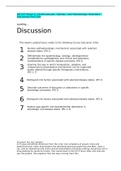
-
NR 507 Week 3: Cardiovascular, Cellular, and Hematologic Disorders - Discussion Part One
- Exam (elaborations) • 42 pages • 2023
-
- $14.99
- + learn more
VNR 507 Week 3: Cardiovascular, Cellular, and Hematologic Disorders - Discussion Part One Loading... Discussion This week's graded topics relate to the following Course Outcomes (COs). Analyze pathophysiologic mechanisms associated with selected disease states. (PO 1) Differentiate the epidemiology, etiology, developmental considerations, pathogenesis, and clinical and laboratory manifestations of specific disease processes. (PO 1) Examine the way in which homeostatic, adaptiv...
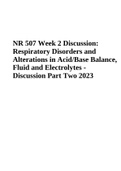
-
NR 507 Week 2 Discussion: Respiratory Disorders and Alterations in Acid/Base Balance, Fluid and Electrolytes - Discussion Part Two 2023
- Exam (elaborations) • 24 pages • 2023
- Available in package deal
-
- $17.49
- + learn more
NR 507 Advanced Pathophysiology. NR 507 Week 2 Discussion: Respiratory Disorders and Alterations in Acid/Base Balance, Fluid and Electrolytes - Discussion Part Two 2023. Analyze pathophysiologic mechanisms associated with selected disease states. (PO 1) 2 Differentiate the epidemiology, etiology, developmental considerations, pathogenesis, and clinical and laboratory manifestations of specific disease processes. (PO 1) 3 Examine the way in which homeostatic, adaptive, and compensatory phy...

-
NR 603: Week 1 Discussion: Compare and Contrast: Benign Positional Vertigo and Meniere's Disease
- Exam (elaborations) • 7 pages • 2023
-
- $8.99
- + learn more
NR 603: Week 1 Discussion: Compare and Contrast: Benign Positional Vertigo and Meniere's Disease Dr. Starks & Class, The purpose of this discussion is to compare and contrast benign positional vertigo (BPV) also known as benign paroxysmal positional vertigo (BPPV) and Meniere’s disease (MD) as well as to disseminate how the provider can recognize and further evaluate similarities and differences in these two similar diseases in order to determine the correct diagnosis and management. BPV...

Study stress? For sellers on Stuvia, these are actually golden times. KA-CHING! Earn from your study resources too and start uploading now. Discover all about earning on Stuvia


